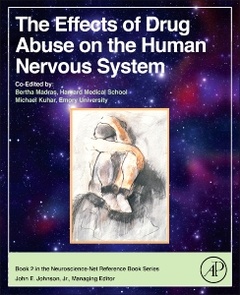The Effects of Drug Abuse on the Human Nervous System
Coordonnateurs : Madras Bertha, Kuhar Michael

Drug use and abuse continues to thrive in contemporary society worldwide and the instance and damage caused by addiction increases along with availability. The Effects of Drug Abuse on the Human Nervous System presents objective, state-of-the-art information on the impact of drug abuse on the human nervous system, with each chapter offering a specific focus on nicotine, alcohol, marijuana, cocaine, methamphetamine, MDMA, sedative-hypnotics, and designer drugs. Other chapters provide a context for drug use, with overviews of use and consequences, epidemiology and risk factors, genetics of use and treatment success, and strategies to screen populations and provide appropriate interventions. The book offers meaningful, relevant and timely information for scientists, health-care professionals and treatment providers.
Chapter 1: Drug Use and its Consequences – B. Madras
Chapter 2: Genetics of Substance Use, Abuse, Cessation, and Addiction: Novel Data Implicate Copy Number Variants - Uhl et al.
Chapter 3: Epidemiology of Drug Abuse: Building Blocks for Etiologic Research - Weinberg et al.
Chapter 4: Detection Of Populations At Risk Or Addicted: Screening, Brief Intervention And Referral to Treatment (SBIRT) in Clinical Settings - L. Gentilello
Chapter 5: Cocaine: Mechanism and Effects in the Human Brain - Trifilieff et al.
Chapter 6: Stress, Anxiety, and Cocaine Abuse - Craige et al.
Chapter 7: The Neuropathology of Drug Abuse - Büttner et al.
Chapter 8: The Pathology of Methamphetamine Use in the Human Brain - S. Kish
Chapter 9: The Effects of Alcohol on the Human Nervous System - K. Brady
Chapter 10: The Nicotine Hypothesis – Brasic
Chapter 11: Smoking Effects in the Human Nervous System – Schuman-Olivier
Chapter 12: Cognitive Effects of Nicotine - Sofuoglu et al.
Chapter 13: Effects of Cannabis and Cannabinoids in the Human Nervous System - H. Kalant
Chapter 14: Cannabis, Cannabinoids, and the Association with Psychosis - Radhakrishnan et al.
Chapter 15: Effects of MDMA on the Human Nervous System - McCann et al.
Chapter 16: Sedative Hypnotics - Ciraulo et al.
Chapter 17: Hallucinogens – Chan/Mendelson
Chapter 18: Inhalants: Addiction and Toxic Effects in Humans - Bowen et al.
Chapter 19: Emerging Designer Drugs - Nichols et al.
Clinical Neurology, Clinical Research Neurologists, Clinical Psychologists, Psychiatry, Neuroscience
- A comprehensive reference on the effects of drug addiction on the human nervous system
- Focuses on core drug addiction issues from nicotine, cocaine, methamphetamine, alcohol, and other commonly abused drugs
- Includes foundational science chapters on the biology of addiction
- Details challenges in diagnosis and treatment options
Date de parution : 01-2014
Ouvrage de 624 p.
19x23.3 cm
Thèmes de The Effects of Drug Abuse on the Human Nervous System :
Mots-clés :
Acute effects; Addiction; Alcohol abuse; Alcohol dependence; Appetite; Cannabis; Chronic effects; Cognitive functions; Drug abuse; Drug dependence; Drug use; Endocannabinoid system; Epidemiology; Etiology; Inhalants; Maturation; Mechanisms of action; Motor control; Nausea; Neuroprotection; Sensory functions; Solvents; Substance abuse; Substance use; Therapeutic uses; Toluene



